13 February 2021
Posted by Beth McKeeman

Soundscape Lens
Group 1 – 14 Group 2 – 3
This weeks activity is courtesy of Artfulscribes Antosh Wojcik and I can link you directly to it here. However that doesn’t make for a very interesting blog.
Both groups started with free writing to a soundscape. Group 1 haven’t done free writing before, so the idea of writing non-stop even if it doesn’t make sense was a bit weird, however it unlocked a lot of ideas. And that’s the intention of free writing, to warm up the frozen pipes of your brain and then come back and sift through it for nuggets of usable ideas and phrases.
The splurge of writing can end up surprising you, it certainly did with many of group 1, who ended up tackling topics they never would have thought of otherwise, such as Gene’s bullying themes, Max killing a bunny, Neelesh writing about weapons, or Eleanor writing about her school geography topic.
When talking about what the soundscape reminded us of, and seeing the pieces everyone created, the difference in how audio is played became striking. The difference between playing the music through computer microphone and screen share (may we continue to learn the many tricks of Zoom) is like the argument of vinyl verses digital. The static sounds and voices that could have come from background interference became more obviously part of the piece through screen share, however the harsh staccato metallic hits were softened. The robots and blacksmiths of group 1 got replaced by radios in group 2. I vaguely recall doing this exercise as part of the Mayflower Creative Writer’s group, led by Antosh, back when we still met in person and coming up with electricity pylons as my image. I wonder if you do this, listening in a different environment, perhaps through headphones, what you will hear.
Both groups went on to write about an emotion as an object, creating a lens, a layer of distance between the written poem and their own experience. This method can make it easier to write about personal subjects. There was a lot of sadness explored, but it was also gratifying to note that last weeks session on voltas was taken to heart, so many of these moods got flipped in the last line, giving a sense of hope.
Group 2 went further with the exercise by using texture to explore relationships to people. Texture is another way of creating a lens and a distance. Based on Thickly-frozen Lakes by Selima Hill, group 2 created an image of two line, followed by a two line stanza on a relationship, repeating as needed. Whilst reviewing our work, we asked how the image connected to the relationship, how it built it, and discussed singular words for minutes.
The fact of the week comes from Susmita after Eleanor asked what the plural of monkey is.
If a Y is preceded by a vowel, the plural is just an S. But if the letter before the Y is a consonant, then it changes to ies. Penny = pennies. But there are always exceptions to the rule.
Thus concludes our first half term of 2021. We hope you enjoyed it. We have a break next week but keep an eye on our social medias. I have an overflow of work from the last few weeks prepared to share so it will be like we’re still here and exciting things are coming with a couple of voice recordings sitting in our inbox.
Keep your eyes peeled and have a fantastic half term.
Cassie's texture lens
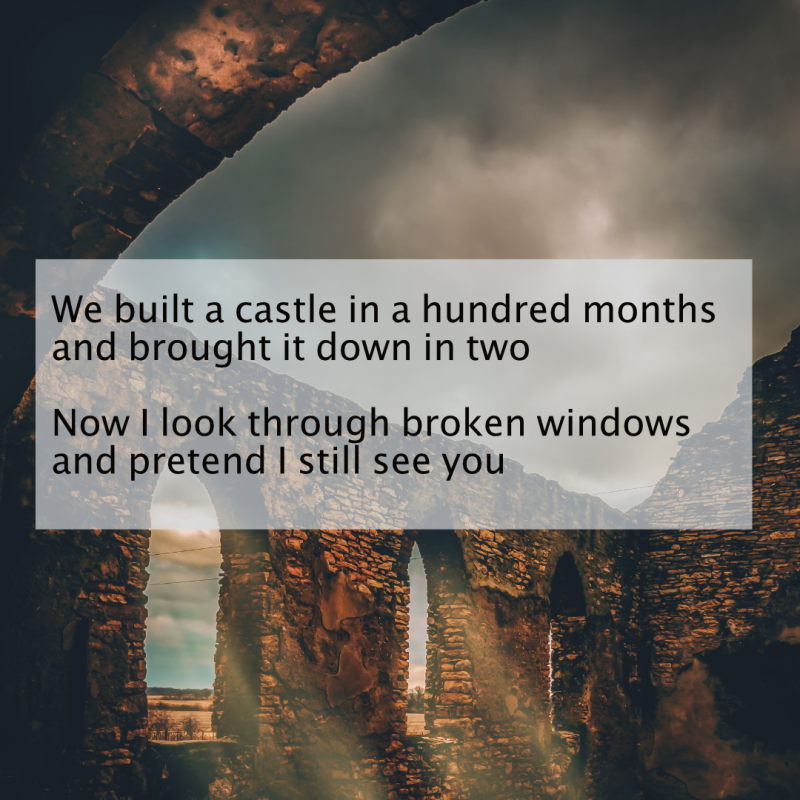
A Lone Rainbow by Eleanor
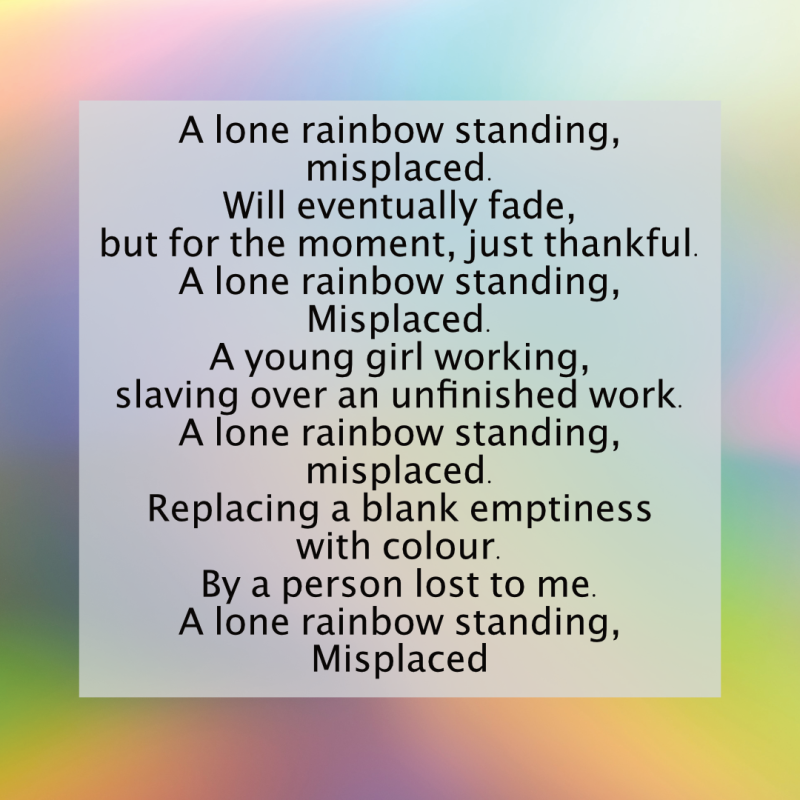
Hannah's texture lens
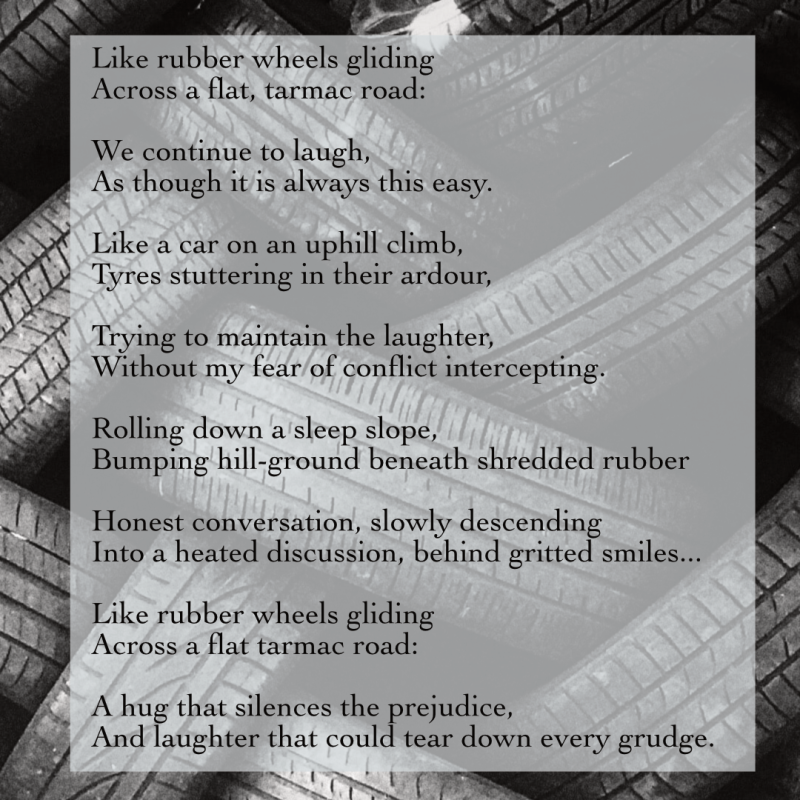
My Happiness is a Screaming Goat by Ian
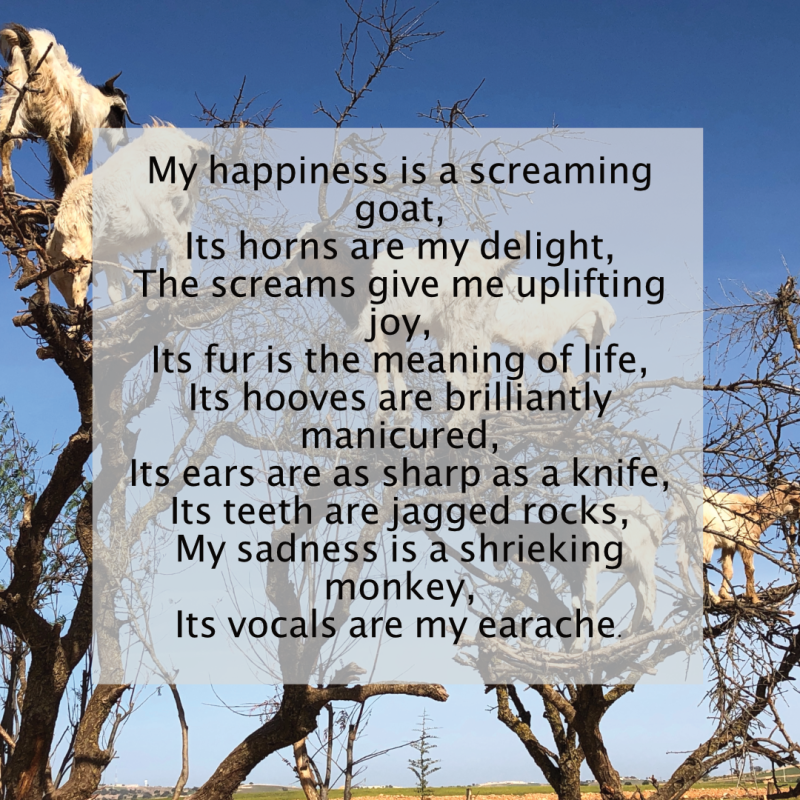
My Happiness is a canvas by Kiki
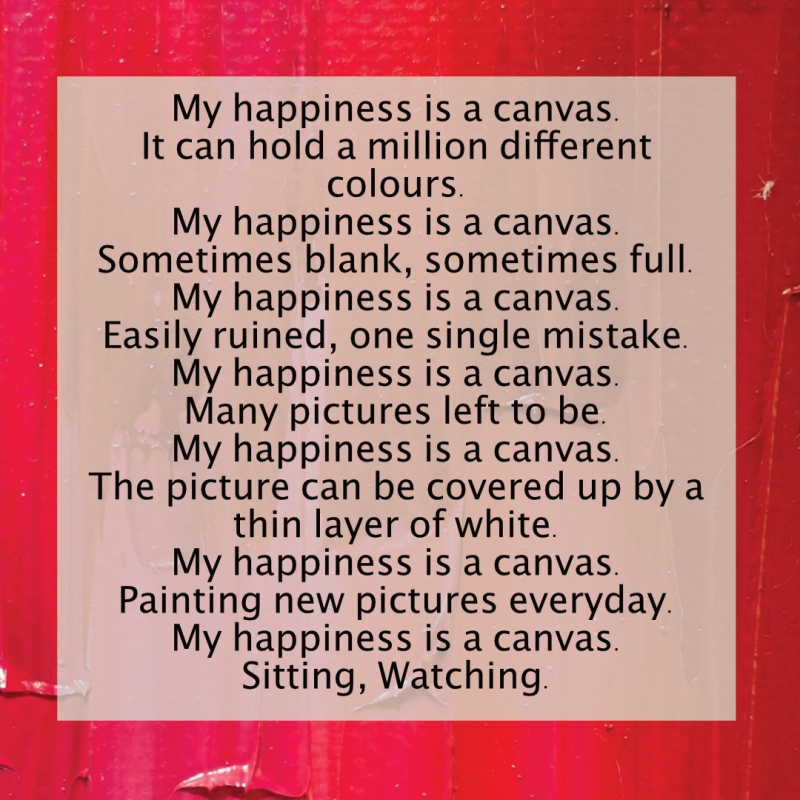
My Boredom as a Cardboard Box by Louise
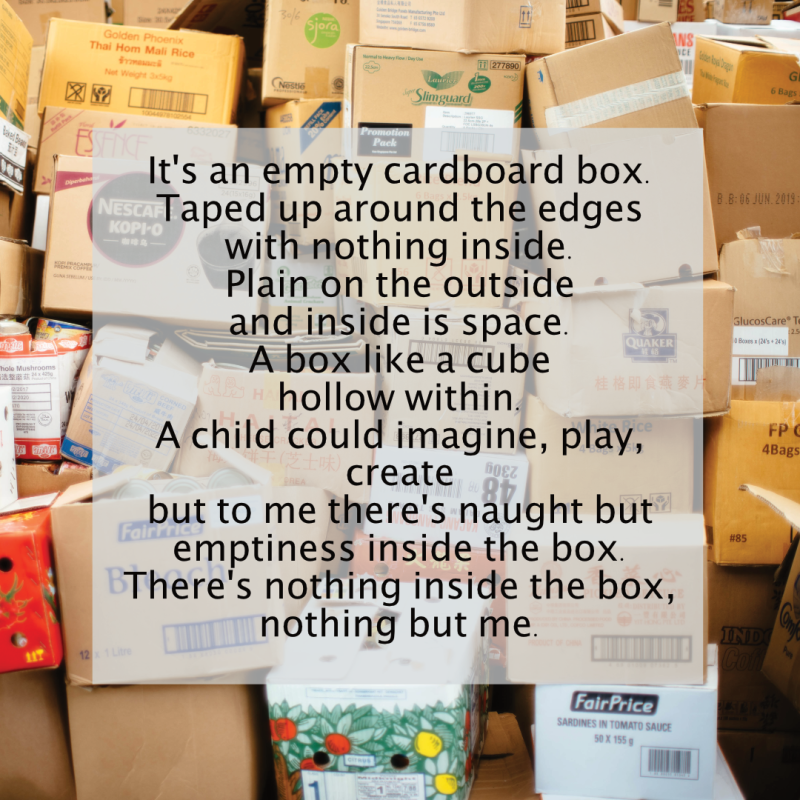
My Sadness is a Broken Rubix Cube by Max
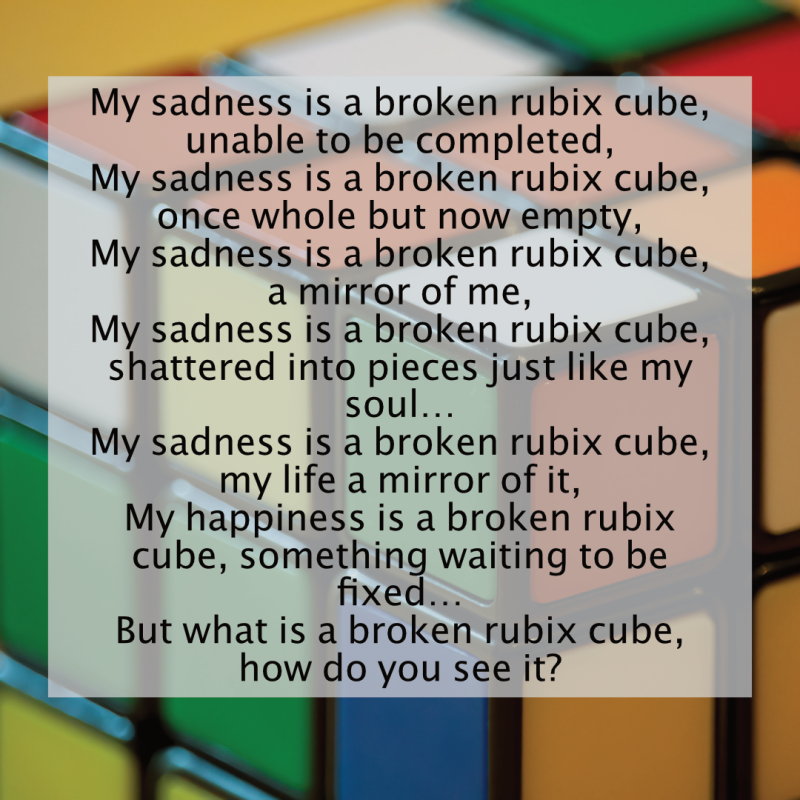
Archive
Junior & Young Writers Week 3: Return From The Magical World
Junior & Young Writers Week 2: African Mythology
Problems, Problems, Problems...
Cautionary Tales & Christmassy Opening Lines
You've Gotta Have Pace, Pace, Pace
Junior & Young Writers Week 1: Alien Encounters
Junior & Young Writers: Week 5 - Play on Words Pt. 2
Junior & Young Writers: Week 11 - end of term showcase [build a bard workshop]
Junior & Young Writers: Week 10 - Greek Theatre - chorus stories
Junior & Young Writers: Week 9 - Greek Origin Stories - Spring
Rubber Ducks & Writing Festivals
Junior & Young Writers: Week 7 - Greek Hero Stories [the 12 labours of Hercules]
Junior & Young Writers: Week 12 [Wild Words] - Stuff & Things
Junior & Young Writers: Week 11 [Wild Words] - World Building 2
Junior & Young Writers: Week 10 [Wild Words] - World Building
Junior & Young Writers: Week 9 [Wild Words] - Mystery & Choose Your Own Adventure
Junior & Young Writers: Week 8 [Wild Words] - Spooky Sequels & Potion Poems
Junior & Young Writers – Week 10 (Writers’ Inspiration) – Final Showcase
Junior & Young Writers – Week 9 (Writers’ Inspiration) – Editing & Performance Tips
Junior & Young Writers – Week 8 (Writers’ Inspiration) – Cuteness
Time goes on by Tavinder Kaur New
Junior & Young Writers – Week 7 (Writers’ Inspiration) – Natural Solutions
Junior & Young Writers – Week 6 (Writers’ Inspiration) – The Language of Fruit and Veg
Junior & Young Writers – Week 5 (Writers’ Inspiration) – Adventures In Space
Tinklebobs and Bedraggled Angles
Junior & Young Writers – Week 4 (Writers’ Inspiration) – Our Environment
Fortune Tellers & Future Letters
Junior & Young Writers – Week 3 (Writers’ Inspiration) – Home
Young Writers - Week 10 (The Art of Writing) – Final Week Showcase
Junior Writers - Week 10 (The Art of Writing) – Final Week Showcase
Young Writers – Week 9 (The Art of Writing) – Choose Your Own Adventure
Junior Writers – Week 9 (The Art of Writing) – Choose Your Own Adventure
Young Writers – Week 8 (The Art of Writing) – Sequel Stories
Junior Writers – Week 8 (The Art of Writing) – Sequel Stories
Young Writers – Week 7 (The Art of Writing) – Picture Prompts
Junior Writers – Week 7 (The Art of Writing) – Picture Prompts
Young Writers - Week 6 (The Art of Writing) - Script-writing & Dialogue
Junior Writers - Week 6 (The Art of Writing) - Script-writing & Dialogue
Junior Writers – Week 5 (The Art of Writing) – Poetry
Young Writers - Week 5 (The Art of Writing) - Poetry Potions
Edward The Martyr - A Competition!
Mood Boards and Postcards from Space
Young Writers - Week 3 (The Art of Writing) - PLOT
Junior Writers - Week 3 (The Art of Writing) - PLOT
Moomin Stories and Hollywood Pitches
Young Writers - Week 2 (The Art of Writing) - Genre & Setting
Junior Writers - Week 2 (The Art of Writing) - Genre & Setting
Prompts, Dialogues, and Cliché
Story Structure Part One: Exposition and Beyond...
Young Writers - Week 1 (The Art of Writing) - Character
Junior Writers - Week 1 (The Art of Writing) - Character
Young Writers - week 4 - Nature Writing [animals & wildlife]
Junior Writers - week 4 - Nature Writing [animals & wildlife]
Young Writers - week 3 - Nature Writing [trees/plants/flowers]
Junior Writers - week 3 - Nature Writing [trees/plants/flowers]
Young Writers - week 2 - 'fractured fairy tales'
Junior Writers - week 2 - 'fractured fairy tales'
Young Writers - week 1 - 'from deep inside a forest'
Creating Communities through Writing
WORDCUP - Hounsdown Session #6
Making pillows in a house full of feathers
WORDCUP - Hounsdown Session #5
Exploring home – a place, person, house
WORDCUP - Hounsdown Session #4
Stories From Our Streets at the Abbeyfield Wessex Society Reminiscence Session at Poole Library
What Do You Really Mean? Writing Dialogue for Scripts
WORDCUP - Hounsdown Session #3
Character Building & Murder Mysteries
Going inside – from a spark to a story
WORDCUP - Hounsdown Session #2
Maybe I Can Be Invisible After All... Monologues
Creative Writing: Fun Facts, Diverse Voices and Different Perspectives
Writing Competition - Stories From Our Streets
Stories From Our Streets Community Activity Pack
Thinking in-quiet, after the fire
Found Cities, Lost Objects: Women in the City Curated by Lubaina Himid CBE
Ekphrastic Jukebox - Writing to Music
ArtfulScribe LitFest Community Showcase 2023
Young writers exercise their creative power
Writing to The Sorcerer's Apprentice
The Mousetrap - Mayflower Young and Junior Writers Investigate Mystery!
Stories From Our Streets Launch!
Interview: In Conversation with Dr Victoria Leslie
The Missing Farmer/ Blackout Poetry & DADA
Exploring this wonderful World
Using props to create characters/ working as a writing room
Stories of the Dust and Character Questions
Storytelling and Escalation or Rising Action
Junior Writers Club Acrostic Poem
Notes on Intention for MAST Collective - Year 3 - Facilitation Focus
Earthquakes & Dominoes - MAST Collective Blog #4
SUPER MARIO AND POP CULTURE POEMS
Receptionists & Inky Voids - MAST Collective Blog #3
Saying No and saying YES on National Poetry Day!
There's a Dragon in the Wardrobe...
House Warming Party (The Mortifying Ordeal of Being Known) - MAST Collective Blog #2
Intern Blog 5 - The Publishing Process
POEMS TO SOLVE THE CLIMATE CRISIS
On The Streets With Theresa Lola
Intern Blog 4 - The Internship Journey
NEW DIRECTIONS, STARTING SMALL - THE ORWELL YOUTH PRIZE
LIGHTHOUSES, HOPE AND METAPHORS
on workshop and transformations: frogs, lions, and the duck that becomes a larder...
Poetry Ambassadors - Interview with April Egan
Intern Blog 1 - Finding a Voice
World Poetry Day: Fluffypunk and the Invisible Women
On Being a Writer: A Conversation by Beth Phillips & Sam Morton
Poetry Ambassadors - Interview with Kaycee Hill
UNHEARD VOICES: INTERNATIONAL WOMEN'S DAY, AND STORIES OF CONFLICT













